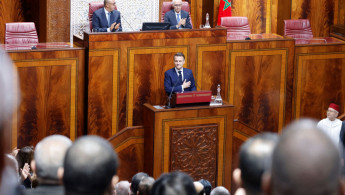Protests follow France's Macron remarks describing Hamas as 'barbaric' in Moroccan parliament
French President Emmanuel Macron's recent remarks in the Moroccan parliament describing the Palestinian Islamic group Hamas as "terrorist" and "barbaric" have set off protests from pro-Palestine activists and accusations of reviving long-standing colonialist rhetoric.
On 29 October, Macron spoke to a full Chamber on the historic ties between France and Morocco, Morocco's bid for sovereignty over the disputed Western Sahara, and a call for peace in Gaza and Lebanon.
His description of Hamas as "barbaric" while defending Israel's "right to self-defence" quickly ignited anger across Morocco, a country with deep-rooted support for Palestinian rights.
Hours after Macron's speech, dozens of demonstrators gathered outside parliament, chanting, "Macron is a liar, resistance is not terrorism." By the time the protesters showed up, Macron had already left the building.
Macron's use of the phrase "barbaric" has particular historical resonance in the country, where France's colonial administration frequently used the term "Berber" to depict the indigenous Amazigh people as primitive and uncivilised. The term remains a reminder of colonialist narratives that attempted to cast French civilisation in contrast to North African "barbarism."
Protesters also called for accountability from the Moroccan MPs who applauded Macron for his remarks. Cameras from Morocco's state-run parliamentary media focused solely on Macron, leaving unclear which MPs applauded.
"I raised my keffiyeh and Palestinian flag [...] Macron saw me, but the TV cameras ignored me," said Nabila Mounib, the only representative of the Unified Socialist Party in parliament.
Meanwhile, the Justice and Development Party (PJD), an Islamist Party, expressed that their MPs had planned to respond to Macron's remarks but refrained, "out of respect for him as a guest of his majesty King Mohammed VI."
Both opposition parties said they consider Hamas' actions an act of resistance against the Israeli occupation and the years-long besiege of the Gaza Strip.
The New Arab contacted other MPs for comments, namely from the three majority parties–the Istiqlal Party, the Authenticity and Modernity Party (PAM), and the National Rally of Independents (RNI)–but no one was available to answer by the time of publication.
Since last October, Rabat has faced increasing social and political pressure to revoke the normalisation agreement it signed with Tel Aviv in late 2020 – a deal brokered under U.S. auspices in exchange for American recognition of Morocco's sovereignty over the disputed territory of Western Sahara.
The Moroccan monarch has blamed Israel for "escalations" in Gaza but has refrained from commenting on Morocco's diplomatic relationship with Tel Aviv since the onset of the ongoing genocide in Gaza, which has resulted in the deaths of more than 43,000 people in the strip.




 Follow the Middle East's top stories in English at The New Arab on Google News
Follow the Middle East's top stories in English at The New Arab on Google News
![A group of Palestinians, foreign and Israeli activists gather to participated in an olive picking event on the land in the town of Battir, which is under threat of confiscation by Israel in Bethlehem, occupied West Bank on 8 November 2024. [Getty]](/sites/default/files/styles/image_330x185/public/2182930803.jpeg?h=199d8c1f&itok=__0LgGsa)

![People gathered around the rubble of destroyed houses to search for survivors [Getty]](/sites/default/files/styles/image_330x185/public/2024-11/GettyImages-2184733820.jpg?h=199d8c1f&itok=NiM1LO2f)